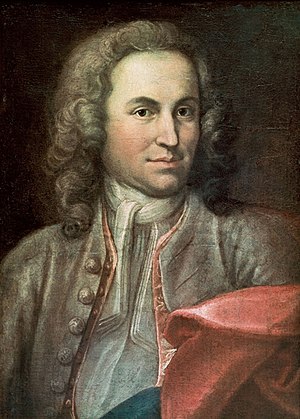| English: Young Johann Sebastian Bach. 1715. Teri Noel Towe seems to demonstrate that the portrait is probably not of Bach http://www.npj.com/thefaceofbach/09w624.html. (Photo credit: Wikipedia) |
Thanks to The Washington Post (Style, C10, 9/25/2012), Ms Porter's music review of works performed locally by the Washington Bach Consort led me this morning to YouTube, to savor some of the cited works: “Preise, Jerusalem, den Herrn,” BWV 119, “composed to honor the Leipzig town council’s inauguration in 1748,” and Bach’s “Lobe den Herrn,” BWV 69. (She noted also Washington Bach Consort’s performance of John Blow’s “God spake sometime in visions” and William Boyce’s “The king shall rejoice.”)
When I hear certain compositions by J. S. Bach, I recall that
God is working all things together for good to those who love Him, as St. Paul
wrote in the familiar Romans 8:28 scripture. That Bach wrote music for “the
glory of God and the recreation of the mind” is evident. His composing has
brought us a sense that life is intended for good, capable of higher planes
that we can only attempt to imagine or dream; yet by the grace of faith we participate
in them, in part, now and will participate fully one future day.
J.S. Bach is my favorite composer, but not an exclusive favorite, if that makes sense to you. It is like love, this love of certain music, in that it is open, receptive, varied, and unlimited. Bach's inventive genius works behind music of the eras since his time. I recommend you to listen
to an overview, with music excerpts, of Bach’s life and musical influences. Also, look for audio or video featuring Yo Yo Ma or Rostropovich playing Bach cello compositions.
I came to know of Bach’s life at about age
eight or nine, when my new sister-in-law gave me a children’s biography of his
life. I was taking piano lessons and she, a calm, intelligent young woman, recently
married to my oldest brother, held my fascination. Anyone that could catch one
of my handsome brothers had to be special. She set a bright tone, beginning by
directing me to an interest to Bach.
No one has to know, grasp, or understand most
of the deeper technicalities of the composing genius of Bach. You may know what
I mean, perhaps having, as I did, to learn Two-part Inventions and the calming, flowing "Well-Tempered Clavier.” Of the latter, I relate instantly to what one concert
pianist, who plays it every day, said:
It
has something good for the soul…
“...it
is so pure, cleansing...
like
taking a shower,”
“Bach was able,” says one of the video commentators,
“to articulate the inner self of modernity…um, and we are modern people… (his
music) gives to our fragmented lives a…sense of significance that takes us beyond the muddled present and helps us
touch something timeless and eternal….” –
“The glory of God and the recreation of the
mind…”
—the musical reasoning of Bach
________________________________
Sources: All quotes not cited from The Washington Post are from the YouTube
video. Subscribers to The Washington
Post by delivery can get e-paper free and paste: http://thewashingtonpost.newspaperdirect.com/epaper/viewer.aspx
If you like this blog, would you Join, Tweet, FB, Like, or Recommend it?
Copyright (c) 2012 Opinari Writers.



No comments:
Post a Comment